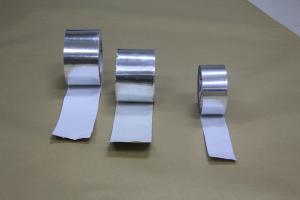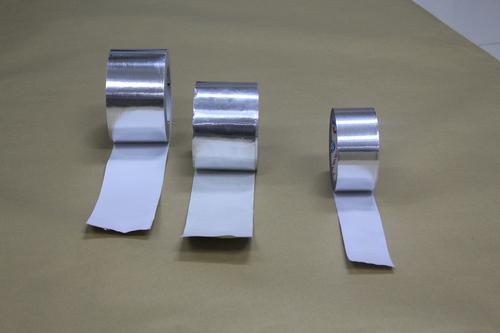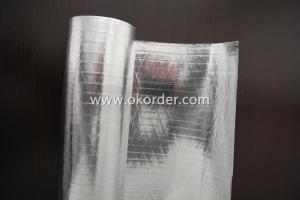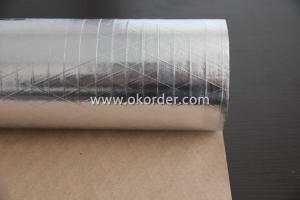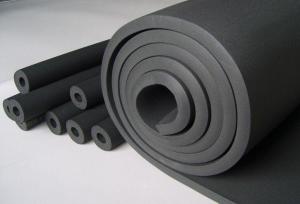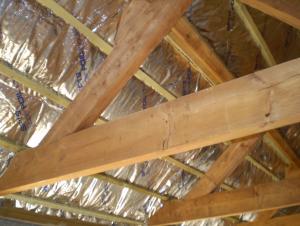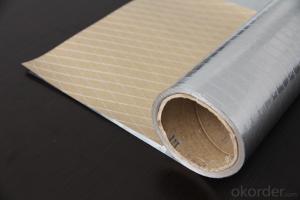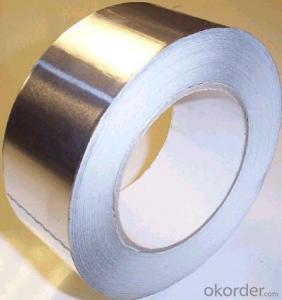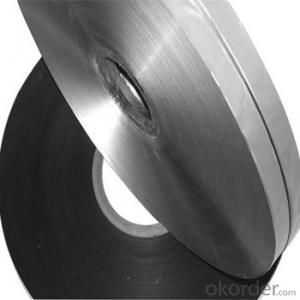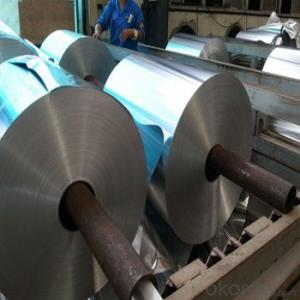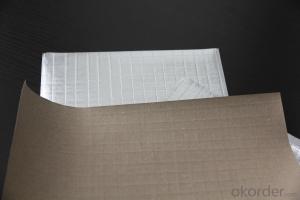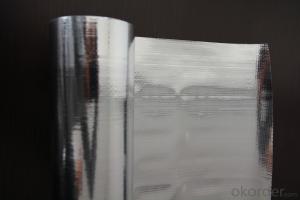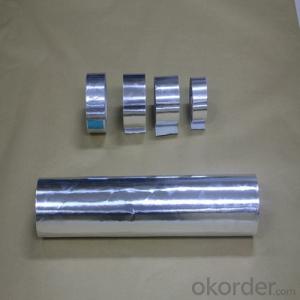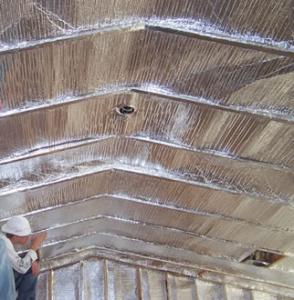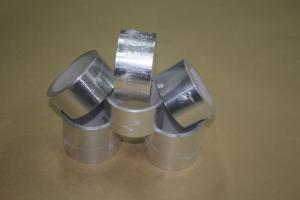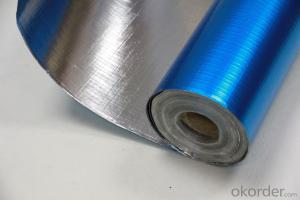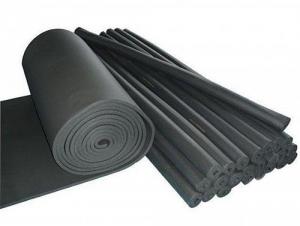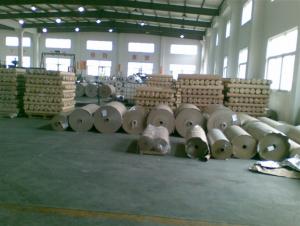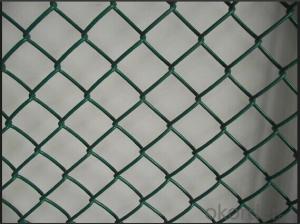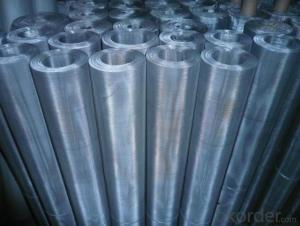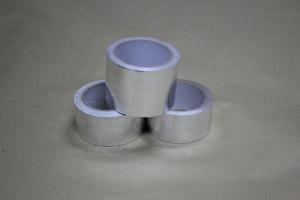Aluminum Foil Facing White Silicon Paper Tape
- Loading Port:
- China Main Port
- Payment Terms:
- TT OR LC
- Min Order Qty:
- -
- Supply Capability:
- -
OKorder Service Pledge
OKorder Financial Service
You Might Also Like
Specifications
aluminum foil mesh cloth/fiberglass mesh backed alu foil:To be sealed on glass wool or other duct wraps of HVAC system
Detailed Product Description
Reflective Insulation
1.Alu. Foil:7microns
2.Kraft paper:50/60gsm
3.Tri-way scrim
4.wall & house insulation
Model 1:Double side reflective alu foil FSK:
Model: FSK-7160A
7u AL/ 3 way fiberglass Scrim: 8 x 12mm / PE / Kraft: 60gsm / PE /7u AL
Model: FSK-7160B
7u AL/ 2 way fiberglass Scrim: 12.5X12.5mm / PE / Kraft: 60gsm/ PE /7u AL
Model 2:Kraft paper:
Model: FSK-7160A
7u AL / 3 way fiberglass Scrim: 8 x 12mm / PE / Kraft: 60gsm
Model: FSKV-7150B
7u AL/ 2 way fiberglass Scrim: 12.5X12.5mm / PE / Kraft: 50gsm
Specifications:
1) Roll width: 1.2, 1.25, 1.3, 1.35m
2) Roll length: 50-100m.
Application:
To be sealed on glass wool or other duct wraps of HVAC system, or to be used as sound/heat insulator for high-rise buildings and hotels, or works as vapor barrier and thermal insulation facing for metal building. Excellent thermal insulation materials of the steam heating pipelines, sound-proof materials in construction and the protective layer of glass wool blanket as well as the packing materials for the export equipment with excellent functions of non-combustible, heat isolation, vapor barrier, mildew proof, anti-corrosion, and sound absorbability.
- Q: What specific cleaning procedures should be followed after using aluminum foil facing?
- <p>After using aluminum foil facing, there are a few special cleaning methods to consider. First, remove any leftover food or debris from the surface. If it's a reusable aluminum foil facing, gently wash it with warm soapy water and a soft sponge, avoiding abrasive materials that could scratch the surface. Rinse thoroughly and dry completely to prevent rust. For disposable foil, simply dispose of it according to local waste management guidelines. Avoid using harsh chemicals or extreme heat as they can damage the aluminum foil facing. Regular maintenance will ensure the longevity and hygiene of your aluminum foil facing.</p>
- Q: What are some effective ways to utilize aluminum foil in the kitchen?
- <p>Using aluminum foil effectively in the kitchen can enhance cooking and food preparation. Here are a few tips: 1) Line baking sheets to prevent food from sticking and make cleanup easier. 2) Create a tent over food when roasting to retain moisture and prevent over-browning. 3) Use foil to wrap individual portions for steaming or baking, which can be helpful for portion control. 4) Create a foil packet for cooking fish or vegetables on the grill or in the oven, which helps to steam and retain flavors. 5) Use foil to shape and mold food, such as a bowl for a souffl茅 or a mold for jello. 6) Double or triple layer the foil for durability when wrapping meats or creating containers. 7) Cut a small piece of foil to cover a small dish or to create a makeshift lid. Always handle with care when removing hot foil from the oven, as it can be very hot.</p>
- Q: What distinguishes aluminum foil facing from other types of facing materials?
- <p>Aluminum foil facing is a type of facing material that uses a thin layer of aluminum, known for its excellent barrier properties against air, moisture, and light. This makes it ideal for insulation and packaging applications where preservation of contents is crucial. In contrast, other types of facings, such as paper, fabric, or plastic, may not offer the same level of barrier protection. Paper facings are often used for their aesthetic appeal and are more breathable, while fabric facings provide flexibility and are used for applications requiring durability and comfort. Plastic facings can be waterproof and are used where a shiny or smooth surface is desired. Each type of facing has unique properties that make it suitable for specific applications, with aluminum foil facing being particularly notable for its barrier capabilities.</p>
- Q: Is it possible to use aluminum foil with a facing to create a sandwich wrap that is more durable and portable?
- <p>Yes, you can use aluminum foil facing to make a sandwich wrap that is more durable and easy to carry. Aluminum foil is known for its strength and resistance to tearing, which makes it a good choice for wrapping sandwiches. The facing can provide an additional layer of protection and can make the wrap more comfortable to handle. However, it's important to ensure that the foil does not come into direct contact with the food, as this could lead to potential health risks. Use a safe barrier, like parchment paper or a food-safe plastic wrap, between the foil and the sandwich to maintain椋熷搧瀹夊叏.</p>
- Q: Is it safe to use aluminum foil with a recycled material facing when baking food?
- <p>Using recycled aluminum foil facing for baking is generally safe, as long as it meets food-grade standards and is specifically designed for cooking applications. Recycled aluminum foil used in cooking should be free from harmful chemicals and should not release any toxic substances when heated. However, it's crucial to check the packaging to ensure it is labeled as 'oven-safe' and 'food-grade.' Avoid using foil that is not intended for cooking, as it may contain additives or coatings that are not safe at high temperatures. Always follow the manufacturer's guidelines for safe use.</p>
- Q: Explain the distinctions between aluminum foil facing and tin foil, including their composition and uses.
- <p>Aluminum foil facing and tin foil are both thin sheets of metal used for various purposes, but they differ in composition and properties. Aluminum foil facing is a thin layer of aluminum bonded to a substrate, often used in construction for insulation, while tin foil is pure tin and is used for wrapping food or as a decorative element. Aluminum foil is lightweight, corrosion-resistant, and conducts heat well, making it ideal for cooking and insulation. Tin foil, on the other hand, is less common in everyday use due to its higher cost and lower durability compared to aluminum. It is often used in niche applications such as art and craft projects or for certain types of food packaging that require a barrier to light and oxygen.</p>
- Q: Is it possible to use aluminum foil facing to create a container for holding liquids or powders?
- <p>While aluminum foil facing can be used to create a temporary or makeshift container for storing liquids or powders, it is not recommended for long-term storage due to potential permeability issues. Aluminum foil is not watertight and can allow moisture and air to pass through, which may affect the quality of the stored substances. For liquids, it can also be prone to leaks. It is better to use containers specifically designed for the purpose, made from materials that are impermeable and suitable for the substances being stored.</p>
- Q: What are the various materials used as facings for aluminum foil, and how do they differ from one another?
- <p>Aluminum foil facing materials are used in construction and insulation to provide a barrier against air and moisture. The different types include: 1) Kraft paper facing, which is a strong, absorbent paper used for general purposes; 2) Glassine facing, a thin, glossy paper with good water resistance; 3) PE-coated facing, where a layer of polyethylene is applied for enhanced water resistance; 4) Aluminum foil facing, which is a thin layer of aluminum for superior barrier properties; 5) Silicone-treated glass fabric, offering high-temperature resistance and used in high-performance applications. Each type has unique properties affecting their use in various applications.</p>
- Q: Is it possible to recycle aluminum foil facing multiple times? If yes, what is the process involved?
- <p>Yes, aluminum foil facing can be recycled multiple times. The recycling process involves collecting and sorting aluminum waste, which is then shredded or crushed. The material is melted in a furnace at high temperatures, and the molten aluminum is poured into molds to form new products. This process can be repeated indefinitely without losing the quality of the aluminum, making it one of the most recycled materials globally. The recycling of aluminum saves energy and reduces the environmental impact compared to producing aluminum from raw materials.</p>
- Q: Explain the differences between aluminum foil facing and plastic wrap when it comes to storing food.
- <p>Aluminum foil facing and plastic wrap are both used for food storage, but they have distinct properties. Aluminum foil facing is a moisture-resistant barrier that reflects heat, making it ideal for cooking and reheating food in the oven or microwave. It's also good for sealing in freshness and preventing freezer burn. Plastic wrap, on the other hand, is a clingy film that tightly seals around food to keep it fresh. It's transparent, allowing you to see the contents, and is useful for covering dishes and bowls. However, it's not heat resistant and can melt or release harmful chemicals when heated, so it's not suitable for cooking or reheating food.</p>
Send your message to us
Aluminum Foil Facing White Silicon Paper Tape
- Loading Port:
- China Main Port
- Payment Terms:
- TT OR LC
- Min Order Qty:
- -
- Supply Capability:
- -
OKorder Service Pledge
OKorder Financial Service
Similar products
Hot products
Hot Searches
Related keywords
